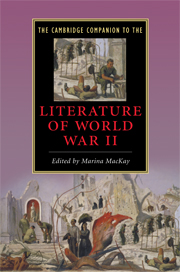Introduction
Published online by Cambridge University Press: 28 May 2009
Summary
“We in our haste can only see the small components of the scene,” conceded one poet of the Second World War, writing about the predicament of Second World War poetry itself: “We cannot tell what incidents will focus on the final screen.” Seeing the big picture of a war that stretched across the globe was avowedly difficult at the time, and, notwithstanding the perspective supplied by our seventy years of distance, it remains so. What this book aims to do is to give a sense of those “components of the scene” directly witnessed by individual participants across the globe and reconstructed by onlookers who wrote after the event. All the same, and as many chapters of this book will demonstrate, what the poet calls “the final screen” necessarily remains elusive: as with any historical event and its representations, World War II and its literature are still subject to revision in the light of changing cultural priorities, needs, and interests. There is no definitive way of summing up for all time what the war meant for literature, although we hope to show in this volume at least how it looks in our own time. “War's being global meant that it ran off the edges of maps,” wrote the Anglo-Irish novelist Elizabeth Bowen in her novel of wartime espionage, The Heat of the Day (1948): “it was uncontainable.” Here Bowen is describing the impossibility of keeping in mind the multiple locations of a war on and around the Atlantic, Mediterranean, and Pacific Oceans, a war fought in deserts and jungles, on seas, fields, plains, and familiar city streets. “Where is the front?” Leo Mellor asks in his chapter on war reportage, responding to that contemporary sense that World War II had rendered inadequate, even entirely irrelevant, long-held assumptions about where - which is to say, how - wars are fought.
- Type
- Chapter
- Information
- Publisher: Cambridge University PressPrint publication year: 2009
- 2
- Cited by



